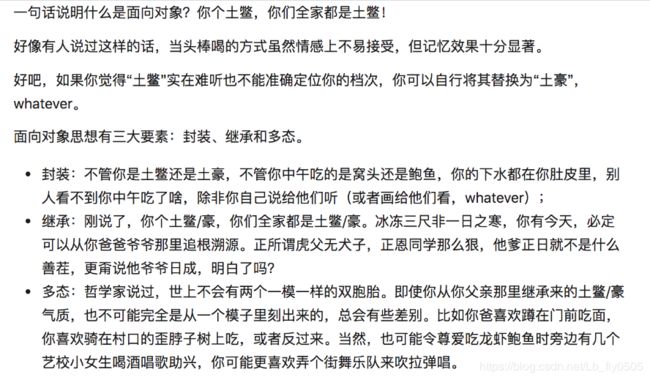- Python的Matplotlib库详解
pumpkin84514
python相关pythonmatplotlib开发语言
Python的Matplotlib库详解Matplotlib是Python中功能强大的数据可视化库,广泛应用于科研、数据分析、报告生成等领域。它能创建各种类型的图表,帮助用户直观地展示数据。一、使用场景1.数据探索和分析:在数据科学领域,Matplotlib经常被用来绘制各种图表,如折线图、散点图、直方图等,以帮助分析和理解数据。2.报告生成:科研人员和数据分析师常用Matplotlib生成图表,
- Spring Boot 3项目集成Swagger3教程
m0_74825746
springboot后端java
SpringBoot3项目集成Swagger3教程??前言欢迎来到我的小天地,这里是我记录技术点滴、分享学习心得的地方。????技能清单编程语言:Java、C、C++、Python、Go、前端技术:Jquery、Vue.js、React、uni-app、EchartsUI设计:Element-ui、Antd、Color-ui后端技术:SpringBoot、Mybatis-plus、Swagger移
- 头歌实践平台(Educoder):python 教学案例三 字符类型及其操作
Yu_Meng~
头歌python开发语言
第1关提取身份证号性别sfzh=input("输入身份证号")#代码开始sex=sfzh[:17]sex=int(sex)ifsex%2==0:print("性别女")else:print("性别男")#代码结束第2关提取身份证号生肖sfzh=input("输入身份证号")#代码开始#生肖对应字符串sxzf="猴鸡狗猪鼠牛虎兔龙蛇马羊"#年份是身份证号的第6位到第9位nf=sfzh[6:10]#注
- 头歌实践平台(Educoder):python练习九 二维列表
Yu_Meng~
头歌python
第1关订单列表计算排序dd=[["1001","练习本",5,10],["1002","水彩笔",35,3],["1003","三角板",20,5],["1004","练习本",5,2],["1005","三角板",20,3],["1006","圆珠笔",5,10],["1007","水彩笔",35,2],["1008","圆珠笔",5,1]]#代码开始#计算每个订单的金额(单价*数量),加入到每
- Python 爬虫入门教程:从零构建你的第一个网络爬虫
m0_66323401
python爬虫开发语言
网络爬虫是一种自动化程序,用于从网站抓取数据。Python凭借其丰富的库和简单的语法,是构建网络爬虫的理想语言。本文将带你从零开始学习Python爬虫的基本知识,并实现一个简单的爬虫项目。1.什么是网络爬虫?网络爬虫(WebCrawler)是一种通过网络协议(如HTTP/HTTPS)获取网页内容,并提取其中有用信息的程序。常见的爬虫用途包括:收集商品价格和评价。抓取新闻或博客内容。统计数据分析。爬
- TypeError:__init__() missing 1 required positional argument :‘problem‘
菜鸟猿小江
pythongithubvscodeubuntu
成功解决TypeError:__init__()missing1requiredpositionalargument:'problem'偶然遇见python报错__init__()missing1requiredpositionalargument:'problem'报错代码:response=p.map(searchParallel,paramList)多方查找检查未发现错误,重装Ubuntu未
- web后端开发时不同框架的区别与选择
金色飞贼分贼本贼
pythondjango
Django、Flask和Node.js(Express)都是非常流行的Web开发框架,它们各有优缺点,适用于不同的开发场景。为了帮助开发者进行项目开发时做出更好的选择,这里介绍这几个框架的特点、优缺点、以及适用场景。一、Django(Python)概述:Django是一个高级的PythonWeb框架,它鼓励快速开发和干净、务实的设计。Django是一个“全栈”框架,提供了很多开箱即用的功能,如身
- 毕业设计--基于Python+Django框架的豆瓣图书评论推荐可视化系统
源码空间站11
python课程设计django毕业设计人工智能后端豆瓣图书爬虫
1.系统概述本系统是一个基于Python和Django框架的豆瓣图书评论推荐可视化系统。通过收集并分析豆瓣图书的评论数据,结合可视化技术,系统能够为用户推荐感兴趣的图书,并以直观的方式展示图书评论的统计信息和分析结果。2.项目目标本项目的主要目标是设计并实现一个豆瓣图书评论推荐系统,具体目标如下:图书评论数据采集与存储:系统能够从豆瓣平台抓取图书评论数据,并将其存储在本地数据库中(db.sqlit
- python type函数_Python type()函数
cunchi4221
pythonjavajavascriptjsphpViewUI
pythontype函数Pythontype()函数(Pythontype()Function)Pythonhasalotofbuit-infunction.Thetype()functionisusedtogetthetypeofanobject.Python具有很多内置功能。type()函数用于获取对象的类型。Pythontype()functionsyntaxis:Pythontype()函
- Python 网页控制自动化 getEdgeDriver
chenchihwen
服务器mysql运维
透过python使用edge执行自动化时,原来的代码出现报错了执行报错啦:messageinfo如下显示HTTPSConnectionPool(host='msedgedriver.azureedge.net',port=443):Maxretriesexceededwithurl:/130.0.2849/edgedriver_win64.zip(CausedbyNewConnectionErro
- 函数与lambda表达式
叶清湑
学习笔记pythonlambda
函数与lambda表达式在Python中,函数分为普通函数与lambda函数。Lambda是一个匿名函数,它是一种简写,表达更快。写法如下:自定义函数名=lambda若干参数:操作表达式deffun1(a,b,c):returna*b*cprint(fun1(3,4,10))fun2=lambdaa,b,c:a*b*c;print(fun2(3,5,10))
- Python VS Code报错ModuleNotFoundError: No module named ‘numpy‘以及No module named ‘xxx‘的原因及解决办法
猛狗哭泣
数据分析pythonbuganaconda
ModuleNotFoundError的两种类型及解决方法Nomodulenamed'numpy'Nomodulenamed'xxx'Nomodulenamed‘numpy’有的时候我们想import常用的包比如numpy或者pandas,而且电脑上是有安装这些包并且在Jupyter中可以正常使用的,但在VSCode或者Pycharm中import却会出现如题的错误。发生这种报错的原因是VSCod
- 【20.5 python中的FastAPI】
wang151038606
python语言入门学习pythonfastapi开发语言
python中的FastAPIFastAPI是一个现代、快速(高性能)的Web框架,用于构建API,基于Python3.6+的类型提示。它利用了Python3.7+的新特性,如类型提示(TypeHints),来自动生成API文档(基于OpenAPI和SwaggerUI),以及进行参数校验和序列化/反序列化。FastAPI旨在简化API开发,同时保持高性能。FastAPI的特点快速:极高的性能,可与
- 华为OD机试E卷 --游戏分组--24年OD统一考试(Java & JS & Python & C & C++)
飞码创造者
最新华为OD机试题库2024华为od游戏javajavascriptc++cpython
文章目录题目描述输入描述输出描述用例题目解析Js算法源码python算法源码java算法源码c++算法源码c算法源码题目描述部门准备举办一场王者荣耀表演赛,有10名游戏爱好者参与,分为两队,每队5人。每位参与者都有一个评分,代表着他的游戏水平。为了表演赛尽可能精彩,我们需要把10名参赛者分为示例尽量相近的两队。一队的实力可以表示为这一队5名队员的评分总和。现在给你10名参与者的游戏水平评分,请你根
- python中报错“ModuleNotFoundError: No module named ‘openpyxl‘”
wang151038606
python中bugpython中的安装包python
python中报错“ModuleNotFoundError:Nomodulenamed‘openpyxl’”importopenpyxl时报错“ModuleNotFoundError:Nomodulenamed‘openpyxl’”在Python中遇到ModuleNotFoundError:Nomodulenamed'openpyxl'这个错误,通常意味着你的Python环境中没有安装openpy
- 实现实时通信:使用Python WebSocket与服务器进行交互
清水白石008
Python题库pythonpythonwebsocket交互
实现实时通信:使用PythonWebSocket与服务器进行交互在现代网络应用中,实时通信变得越来越重要。无论是在线聊天、股票交易还是游戏,能够即时交换数据是提升用户体验的关键。WebSocket协议作为一种实现双向通信的标准,提供了有效的解决方案。本文将带你深入理解如何使用Python编写一个简单的WebSocket客户端,与服务器进行实时通信。一、WebSocket协议概述1.1WebSock
- Python中常见关键字及其用法介绍
xiaoweids
编程语言Pythonpython开发语言
这篇文章主要介绍了Python中有哪些关键字及关键字的用法,分享python中常用的关键字,本文结合示例代码给大家介绍的非常详细,对大家的学习或工作具有一定的参考借鉴价值,需要的朋友可以参考下Python有哪些关键字Python常用的关键字1and,del,from,not,while,as,elif,global,or,with,assert,else,if,pass,yield,break,e
- Python使用QQ邮箱发送邮件提示
高质量海王哦
pythonpython
python发送qq邮件htmlimportbase64importsmtplibimporttimefromemail.mime.textimportMIMETextdefsend_QQ_mail_HTML():user='
[email protected]'#发送方的邮箱账号passwd='xruuwiyxdcouddjg'#授权码receiver='
[email protected]
- python无人飞机
python无人驾驶 医学芯片
python开发语言
这是一个简单的无人飞机代码示例:classDrone:def__init__(self):self.flying=Falsedeftakeoff(self):ifnotself.flying:print("无人机起飞")self.flying=Trueelse:print("无人机已在空中")defland(self):ifself.flying:print("无人机降落")self.flying
- 第三章、python中的对象、变量、标识符、作用域、引用(调用)及地址的概念(3.1-3.2)------内存地址、创建对象、对象的类型及对象的划分问题
thefg
Python基础详解教程对象的类型创建对象inisid内存地址逻辑地址
第三章、python中的对象、变量、标识符、作用域、引用(调用)及地址的概念本章讲述编程中对象、变量、地址的基本概念及其之间的关系,可迭代对象、可变对象、不可变对象的特点。
- 基于flask框架高校学生宿舍管理系统 (python+mysql+论文)
真纯Django毕设程序
pythonflaskmysql
本系统(程序+源码)带文档lw万字以上文末可获取本课题的源码和程序系统程序文件列表系统的选题背景和意义选题背景:
- Python中global的用法
叉选手
pythonpython
global是python中的一个关键字,作用在变量上,该关键字通常放在函数块中,用来声明该变量为全局变量。例如下面变量a,定义在函数外面的是全局变量a,定义在fun函数里面的a是另一个a,是局部变量a,两者没有任何关系。好比这个地区有个叫张三的人,公办室里有个另一个叫张三的人。他们是两个不同的人。a=10deffun():a=2fun()print(a)#输出10如果想要函数里面的那个a就代表外
- 巨潮PDF年报下载01——python request库
圣道寺
python学习笔记python
目录标题背景代码块背景(70条消息)迅雷API批量下载巨潮年报_无敌的前任的博客-CSDN博客代码块fromwin32com.clientimportDispatch#pipinstallwin32compat#pipinstallpywin32importosimportreimportopenpyxlimportrequestsimporturllib.requestimporttimedef
- python中global的用法
Jqlender
pythonpython
python变量的作用域:Local局部作用域Enclosing闭包函数外的函数中Global全局作用域查找规则:以Local->Enclosing->Global规则查找,即:同名变量,优先引用的是局部变量,在局部找不到,便会去局部外的局部找(例如闭包),再找不到就会去全局找。global关键字x=5deffun_a():print(x)deffun_b():x=x+1print(x)fun_a
- Python 潮流周刊#84:2024 年 Python 的最佳实践(摘要)
python
本周刊由Python猫出品,精心筛选国内外的250+信息源,为你挑选最值得分享的文章、教程、开源项目、软件工具、播客和视频、热门话题等内容。愿景:帮助所有读者精进Python技术,并增长职业和副业的收入。分享了12篇文章,12个开源项目,全文2200字。以下是本期摘要:文章&教程①现代Python开发的良好实践②2024年最先进的Python③回顾一年:2024年的Flask④介绍Annotate
- Python基于matplotlib-scalebar库绘制比例尺
懒大王爱吃狼
pythonpythonmatplotlib开发语言自动化Python基础opencv
在Python中,你可以使用matplotlib-scalebar库来在图表上绘制比例尺。这个库是matplotlib的一个扩展,专门用于在绘图时添加比例尺。以下是一个简单的示例,展示了如何使用matplotlib-scalebar来绘制带有比例尺的图表。首先,你需要安装matplotlib-scalebar库。如果你还没有安装它,可以使用以下命令来安装:pipinstallmatplotlib-
- Python 潮流周刊#77:Python 依赖管理就像垃圾场火灾?(摘要)
python
本周刊由Python猫出品,精心筛选国内外的250+信息源,为你挑选最值得分享的文章、教程、开源项目、软件工具、播客和视频、热门话题等内容。愿景:帮助所有读者精进Python技术,并增长职业和副业的收入。分享了12篇文章,12个开源项目,2则热门讨论,全文2200字。以下是本期摘要:文章&教程①Python依赖管理一种垃圾场火灾②Python的膨胀:精细的项目间依赖关系分析③分享我的Django项
- Python 潮流周刊#74:创下吉尼斯世界记录的 Python 编程课(摘要)
python
本周刊由Python猫出品,精心筛选国内外的250+信息源,为你挑选最值得分享的文章、教程、开源项目、软件工具、播客和视频、热门话题等内容。愿景:帮助所有读者精进Python技术,并增长职业和副业的收入。本期分享了12篇文章,12个开源项目,2则音视频,全文2300字。好消息:即日起至万圣节(12.31),周刊限时99元/年,欢迎订阅!!以下是本期摘要:文章&教程①创下吉尼斯世界记录的Python
- Python 潮流周刊#71:PyPI 应该摆脱掉它的赞助依赖(摘要)
python
本周刊由Python猫出品,精心筛选国内外的250+信息源,为你挑选最值得分享的文章、教程、开源项目、软件工具、播客和视频、热门话题等内容。愿景:帮助所有读者精进Python技术,并增长职业和副业的收入。分享了12篇文章,12个开源项目,1则音视频,全文2000字。以下是本期摘要:文章&教程①PyPI应该摆脱掉它的赞助依赖②创建不分大小写的Python字符串类③用Tree-sitter&Jedi重
- Python 潮流周刊#72:Python 3.13.0 最终版已发布!(摘要)
python
本周刊由Python猫出品,精心筛选国内外的250+信息源,为你挑选最值得分享的文章、教程、开源项目、软件工具、播客和视频、热门话题等内容。愿景:帮助所有读者精进Python技术,并增长职业和副业的收入。分享了14篇文章,12个开源项目,4则音视频,全文2300字。以下是本期摘要:文章&教程①Python3.13.0最终版已发布!②关于Python3.13,了解这些信息就够了③Python3.13
- 解线性方程组
qiuwanchi
package gaodai.matrix;
import java.util.ArrayList;
import java.util.List;
import java.util.Scanner;
public class Test {
public static void main(String[] args) {
Scanner scanner = new Sc
- 在mysql内部存储代码
annan211
性能mysql存储过程触发器
在mysql内部存储代码
在mysql内部存储代码,既有优点也有缺点,而且有人倡导有人反对。
先看优点:
1 她在服务器内部执行,离数据最近,另外在服务器上执行还可以节省带宽和网络延迟。
2 这是一种代码重用。可以方便的统一业务规则,保证某些行为的一致性,所以也可以提供一定的安全性。
3 可以简化代码的维护和版本更新。
4 可以帮助提升安全,比如提供更细
- Android使用Asynchronous Http Client完成登录保存cookie的问题
hotsunshine
android
Asynchronous Http Client是android中非常好的异步请求工具
除了异步之外还有很多封装比如json的处理,cookie的处理
引用
Persistent Cookie Storage with PersistentCookieStore
This library also includes a PersistentCookieStore whi
- java面试题
Array_06
java面试
java面试题
第一,谈谈final, finally, finalize的区别。
final-修饰符(关键字)如果一个类被声明为final,意味着它不能再派生出新的子类,不能作为父类被继承。因此一个类不能既被声明为 abstract的,又被声明为final的。将变量或方法声明为final,可以保证它们在使用中不被改变。被声明为final的变量必须在声明时给定初值,而在以后的引用中只能
- 网站加速
oloz
网站加速
前序:本人菜鸟,此文研究总结来源于互联网上的资料,大牛请勿喷!本人虚心学习,多指教.
1、减小网页体积的大小,尽量采用div+css模式,尽量避免复杂的页面结构,能简约就简约。
2、采用Gzip对网页进行压缩;
GZIP最早由Jean-loup Gailly和Mark Adler创建,用于UNⅨ系统的文件压缩。我们在Linux中经常会用到后缀为.gz
- 正确书写单例模式
随意而生
java 设计模式 单例
单例模式算是设计模式中最容易理解,也是最容易手写代码的模式了吧。但是其中的坑却不少,所以也常作为面试题来考。本文主要对几种单例写法的整理,并分析其优缺点。很多都是一些老生常谈的问题,但如果你不知道如何创建一个线程安全的单例,不知道什么是双检锁,那这篇文章可能会帮助到你。
懒汉式,线程不安全
当被问到要实现一个单例模式时,很多人的第一反应是写出如下的代码,包括教科书上也是这样
- 单例模式
香水浓
java
懒汉 调用getInstance方法时实例化
public class Singleton {
private static Singleton instance;
private Singleton() {}
public static synchronized Singleton getInstance() {
if(null == ins
- 安装Apache问题:系统找不到指定的文件 No installed service named "Apache2"
AdyZhang
apachehttp server
安装Apache问题:系统找不到指定的文件 No installed service named "Apache2"
每次到这一步都很小心防它的端口冲突问题,结果,特意留出来的80端口就是不能用,烦。
解决方法确保几处:
1、停止IIS启动
2、把端口80改成其它 (譬如90,800,,,什么数字都好)
3、防火墙(关掉试试)
在运行处输入 cmd 回车,转到apa
- 如何在android 文件选择器中选择多个图片或者视频?
aijuans
android
我的android app有这样的需求,在进行照片和视频上传的时候,需要一次性的从照片/视频库选择多条进行上传
但是android原生态的sdk中,只能一个一个的进行选择和上传。
我想知道是否有其他的android上传库可以解决这个问题,提供一个多选的功能,可以使checkbox之类的,一次选择多个 处理方法
官方的图片选择器(但是不支持所有版本的androi,只支持API Level
- mysql中查询生日提醒的日期相关的sql
baalwolf
mysql
SELECT sysid,user_name,birthday,listid,userhead_50,CONCAT(YEAR(CURDATE()),DATE_FORMAT(birthday,'-%m-%d')),CURDATE(), dayofyear( CONCAT(YEAR(CURDATE()),DATE_FORMAT(birthday,'-%m-%d')))-dayofyear(
- MongoDB索引文件破坏后导致查询错误的问题
BigBird2012
mongodb
问题描述:
MongoDB在非正常情况下关闭时,可能会导致索引文件破坏,造成数据在更新时没有反映到索引上。
解决方案:
使用脚本,重建MongoDB所有表的索引。
var names = db.getCollectionNames();
for( var i in names ){
var name = names[i];
print(name);
- Javascript Promise
bijian1013
JavaScriptPromise
Parse JavaScript SDK现在提供了支持大多数异步方法的兼容jquery的Promises模式,那么这意味着什么呢,读完下文你就了解了。
一.认识Promises
“Promises”代表着在javascript程序里下一个伟大的范式,但是理解他们为什么如此伟大不是件简
- [Zookeeper学习笔记九]Zookeeper源代码分析之Zookeeper构造过程
bit1129
zookeeper
Zookeeper重载了几个构造函数,其中构造者可以提供参数最多,可定制性最多的构造函数是
public ZooKeeper(String connectString, int sessionTimeout, Watcher watcher, long sessionId, byte[] sessionPasswd, boolea
- 【Java命令三】jstack
bit1129
jstack
jstack是用于获得当前运行的Java程序所有的线程的运行情况(thread dump),不同于jmap用于获得memory dump
[hadoop@hadoop sbin]$ jstack
Usage:
jstack [-l] <pid>
(to connect to running process)
jstack -F
- jboss 5.1启停脚本 动静分离部署
ronin47
以前启动jboss,往各种xml配置文件,现只要运行一句脚本即可。start nohup sh /**/run.sh -c servicename -b ip -g clustername -u broatcast jboss.messaging.ServerPeerID=int -Djboss.service.binding.set=p
- UI之如何打磨设计能力?
brotherlamp
UIui教程ui自学ui资料ui视频
在越来越拥挤的初创企业世界里,视觉设计的重要性往往可以与杀手级用户体验比肩。在许多情况下,尤其对于 Web 初创企业而言,这两者都是不可或缺的。前不久我们在《右脑革命:别学编程了,学艺术吧》中也曾发出过重视设计的呼吁。如何才能提高初创企业的设计能力呢?以下是 9 位创始人的体会。
1.找到自己的方式
如果你是设计师,要想提高技能可以去设计博客和展示好设计的网站如D-lists或
- 三色旗算法
bylijinnan
java算法
import java.util.Arrays;
/**
问题:
假设有一条绳子,上面有红、白、蓝三种颜色的旗子,起初绳子上的旗子颜色并没有顺序,
您希望将之分类,并排列为蓝、白、红的顺序,要如何移动次数才会最少,注意您只能在绳
子上进行这个动作,而且一次只能调换两个旗子。
网上的解法大多类似:
在一条绳子上移动,在程式中也就意味只能使用一个阵列,而不使用其它的阵列来
- 警告:No configuration found for the specified action: \'s
chiangfai
configuration
1.index.jsp页面form标签未指定namespace属性。
<!--index.jsp代码-->
<%@taglib prefix="s" uri="/struts-tags"%>
...
<s:form action="submit" method="post"&g
- redis -- hash_max_zipmap_entries设置过大有问题
chenchao051
redishash
使用redis时为了使用hash追求更高的内存使用率,我们一般都用hash结构,并且有时候会把hash_max_zipmap_entries这个值设置的很大,很多资料也推荐设置到1000,默认设置为了512,但是这里有个坑
#define ZIPMAP_BIGLEN 254
#define ZIPMAP_END 255
/* Return th
- select into outfile access deny问题
daizj
mysqltxt导出数据到文件
本文转自:http://hatemysql.com/2010/06/29/select-into-outfile-access-deny%E9%97%AE%E9%A2%98/
为应用建立了rnd的帐号,专门为他们查询线上数据库用的,当然,只有他们上了生产网络以后才能连上数据库,安全方面我们还是很注意的,呵呵。
授权的语句如下:
grant select on armory.* to rn
- phpexcel导出excel表简单入门示例
dcj3sjt126com
PHPExcelphpexcel
<?php
error_reporting(E_ALL);
ini_set('display_errors', TRUE);
ini_set('display_startup_errors', TRUE);
if (PHP_SAPI == 'cli')
die('This example should only be run from a Web Brows
- 美国电影超短200句
dcj3sjt126com
电影
1. I see. 我明白了。2. I quit! 我不干了!3. Let go! 放手!4. Me too. 我也是。5. My god! 天哪!6. No way! 不行!7. Come on. 来吧(赶快)8. Hold on. 等一等。9. I agree。 我同意。10. Not bad. 还不错。11. Not yet. 还没。12. See you. 再见。13. Shut up!
- Java访问远程服务
dyy_gusi
httpclientwebservicegetpost
随着webService的崛起,我们开始中会越来越多的使用到访问远程webService服务。当然对于不同的webService框架一般都有自己的client包供使用,但是如果使用webService框架自己的client包,那么必然需要在自己的代码中引入它的包,如果同时调运了多个不同框架的webService,那么就需要同时引入多个不同的clien
- Maven的settings.xml配置
geeksun
settings.xml
settings.xml是Maven的配置文件,下面解释一下其中的配置含义:
settings.xml存在于两个地方:
1.安装的地方:$M2_HOME/conf/settings.xml
2.用户的目录:${user.home}/.m2/settings.xml
前者又被叫做全局配置,后者被称为用户配置。如果两者都存在,它们的内容将被合并,并且用户范围的settings.xml优先。
- ubuntu的init与系统服务设置
hongtoushizi
ubuntu
转载自:
http://iysm.net/?p=178 init
Init是位于/sbin/init的一个程序,它是在linux下,在系统启动过程中,初始化所有的设备驱动程序和数据结构等之后,由内核启动的一个用户级程序,并由此init程序进而完成系统的启动过程。
ubuntu与传统的linux略有不同,使用upstart完成系统的启动,但表面上仍维持init程序的形式。
运行
- 跟我学Nginx+Lua开发目录贴
jinnianshilongnian
nginxlua
使用Nginx+Lua开发近一年的时间,学习和实践了一些Nginx+Lua开发的架构,为了让更多人使用Nginx+Lua架构开发,利用春节期间总结了一份基本的学习教程,希望对大家有用。也欢迎谈探讨学习一些经验。
目录
第一章 安装Nginx+Lua开发环境
第二章 Nginx+Lua开发入门
第三章 Redis/SSDB+Twemproxy安装与使用
第四章 L
- php位运算符注意事项
home198979
位运算PHP&
$a = $b = $c = 0;
$a & $b = 1;
$b | $c = 1
问a,b,c最终为多少?
当看到这题时,我犯了一个低级错误,误 以为位运算符会改变变量的值。所以得出结果是1 1 0
但是位运算符是不会改变变量的值的,例如:
$a=1;$b=2;
$a&$b;
这样a,b的值不会有任何改变
- Linux shell数组建立和使用技巧
pda158
linux
1.数组定义 [chengmo@centos5 ~]$ a=(1 2 3 4 5) [chengmo@centos5 ~]$ echo $a 1 一对括号表示是数组,数组元素用“空格”符号分割开。
2.数组读取与赋值 得到长度: [chengmo@centos5 ~]$ echo ${#a[@]} 5 用${#数组名[@或
- hotspot源码(JDK7)
ol_beta
javaHotSpotjvm
源码结构图,方便理解:
├─agent Serviceab
- Oracle基本事务和ForAll执行批量DML练习
vipbooks
oraclesql
基本事务的使用:
从账户一的余额中转100到账户二的余额中去,如果账户二不存在或账户一中的余额不足100则整笔交易回滚
select * from account;
-- 创建一张账户表
create table account(
-- 账户ID
id number(3) not null,
-- 账户名称
nam
